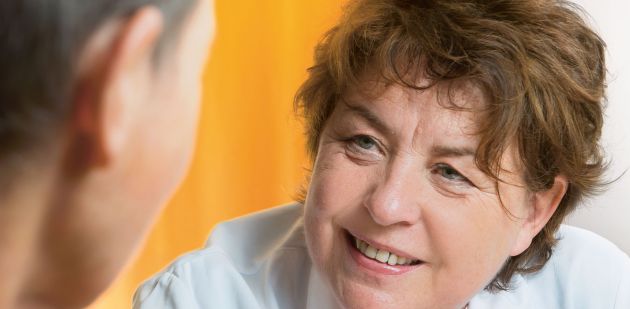Claudia Mazzocato created the first palliative care unit at Lausanne University Hospital (CHUV). Now she is head physician.

"Some doctors say that, to do this job, you can’t be afraid of death. I think they’re wrong.” Claudia Mazzocato is serene, but not without emotion, when she talks about her job. As physician at the Palliative Care Service at the CHUV, lead by Professor Gian Domenico Borasio, she has her work cut out for her. Both at the clinic and in her research, the doctor is confronted with death on a daily basis. She chose that path early in her professional career.
During her post-grad year, Claudia Mazzocato noticed that her patients who were at the end of their life were in pain, and often alone. That was when she knew what her speciality would be. With a certain degree of apprehension, she left for three years to work at the Geneva University Hospitals, the only institution in Switzerland with a palliative care service at the time. “I had no idea how I would react to dealing with death,” she confesses. “After
one month in Geneva, I loved my work. I really got into it.”
Claudia Mazzocato then headed to Paris to complete her studies, spending two six-month periods in the French capital. “That’s when the CHUV administration asked me to lead a focus group to develop a palliative care service at the facility. I suggested forming a mobile team that would work with the different hospital services and go to patients’ homes.” One year later, her proposal was accepted.
The phone rings. One of her patients is on the line. “They can call me any time,” the specialist says. “Having a doctor available is essential for people suffering from a serious illness. Pain doesn’t wait.” These days, most of her time is devoted to consultations at the out-patient oncology service.
On top of her consultations at the oncology service, Claudia Mazzocato also draws up advance directives. “People at the end of their life use these ‘living wills’ to indicate any treatments they would not want, should they lack the mental capacity to take that decision when the time comes,” she explains. “They talk about themselves, their life and their values, both physical and spiritual. We develop a very strong bond. And that’s very rewarding,” she says. “Once during a patient interview, I told a man that I should be paying for the consultation, not him. Patients and their loved ones bring me so much.”
This powerful relationship and the medical challenge
are what shapes Claudia Mazzocato’s speciality. But
isn’t she afraid of the tables turning one day, i.e. being in the position of the patient? “Of course, I think about it every day. I still have fears about death. That’s also why
I do this job.”
Understanding and availability are the watchwords for efficiently meeting the needs of patients with serious illnesses. To this end, Claudia Mazzocato regularly travels with her colleagues to the different hospital wards, providing the patients with more preventive care.